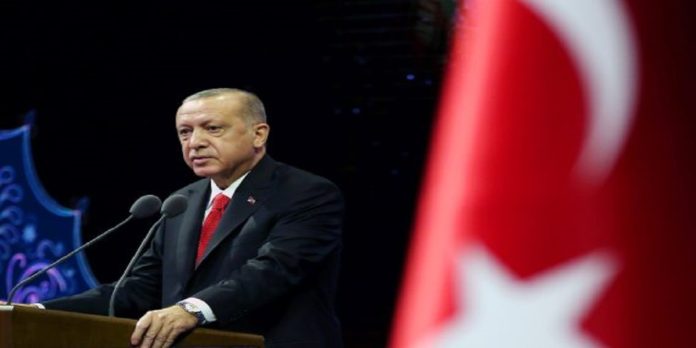ANKARA – Turkish President Recep Tayyip Erdogan on Saturday told his foreign minister to expel the ambassadors of 10 countries including Germany and the United States who appealed for the release of a jailed civil society leader.
The envoys issued a highly unusual joint statement on Monday saying the continued detention of Parisian-born philanthropist and activist Osman Kavala “cast a shadow” over Turkey.
The escalating row with the Western countries — most of which are also NATO allies — caps a torrid week for Turkey in which it was added to a global money-laundering and terrorism-financing blacklist and its currency plunged over fears of economic mismanagement and the risk of hyperinflation.
“I have ordered our foreign minister to declare these 10 ambassadors as persona non grata as soon as possible,” Erdogan said, using a diplomatic term meaning the first step before expulsion.
“They must leave here the day they no longer know Turkey,” he said, accusing them of “indecency”.
The Western ambassadors had called for a “just and speedy resolution” to Kavala’s case.
– ‘President-made crisis’ –
Kavala, 64, has been in jail without a conviction since 2017, and faces a string of charges linked to 2013 anti-government protests and a failed military coup in 2016.
In comments about the ambassadors published in local media on Thursday, Erdogan said “we cannot have the luxury of hosting them in our country”.
The Turkish lira extended its fall into record-low territory against the dollar within moments of Erdogan’s comments on fears of a new wave of Turkish tensions with the West.
The lira has lost one-fifth of its value against the dollar since the start of the year and the annual inflation rate has reached nearly 20 percent — quadruple the government target.
Erdogan is in danger of “dragging the Turkish economy into a president-made crisis”, Eurasia Group said.
The diplomatic friction was compounded when the global financial misconduct watchdog FATF followed through on threats to place Turkey under surveillance for failing to properly combat money laundering and terrorism financing.
Turkey joins a “grey list” of countries that includes Syria, South Sudan and Yemen.
Erdogan had fought hard against the designation, introducing new legislation that was ostensibly aimed to fight terror networks — but which critics said ended up mostly targeted Turkish NGOs that promote pro-Kurdish causes and human rights.
Although not well known internationally, Kavala has become a symbol to his supporters of the sweeping crackdown Erdogan unleashed after surviving the 2016 coup attempt.
Speaking to AFP from his jail cell last week, Kavala said he felt like a tool in Erdogan’s attempts to blame a foreign plot for domestic opposition to his nearly two-decade rule.
“The real reason behind my continued detention is that it addresses the need of the government to keep alive the fiction that the (2013) Gezi protests were the result of a foreign conspiracy,” Kavala said.
“Since I am accused of being a part of this conspiracy allegedly organized by foreign powers, my release would weaken the fiction in question and this is not something that the government would like.”
Kavala was acquitted of the Gezi charges in February 2020, only to be re-arrested before he could return home and thrown back in jail over alleged links to the 2016 coup plot.
The Council of Europe, the continent’s top human rights watchdog, has issued a final warning to Turkey to comply with a 2019 European Court of Human Rights order to release Kavala pending trial.
If Turkey fails to do so by its next meeting on November 30-December 2, the Strasbourg-based council could vote to launch its first disciplinary proceedings against Ankara.
The proceedings could result in the suspension of Turkey’s voting rights and even its membership.
